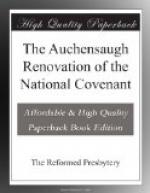the breaches thereof; which is after vows to make
inquiry. (3.) By despising the bond of it; Ezek. xvi.
59. “Which hast despised the oath in breaking
the covenant.” (4.) By defection to the iniquities
which are sworn and engaged against in the covenant,
Jer. xi. 10. “They are turned back to the
iniquities of their forefathers, which refused to
hear my words; and they went after other gods to serve
them; the house of Israel and the house of Judah have
broken my covenant, which I made with their fathers.”
(5.) By changing the government, laws, and ordinances
sworn to be maintained in the covenant; either the
government of the state, without consulting divine
direction, and due inspection into the qualification
of the persons set up, Hos. viii., compare the 1st
and 4th verses. “They have transgressed
my covenant, &c. They have set up kings, but
not by me, princes and I knew it not;” that
is, without consulting me to know my will, and without
my approbation and consent; or the government of the
church, without regard to the revealed will of God.
Thus, Abijah justly chargeth Jeroboam that he had
“cast out the priests of the Lord, the sons of
Aaron, and the Levites,” and that he had “made
priests after the manner of the nations of other lands;”
but encourages himself that he and Judah had the Lord
for their God, because they had not forsaken him;
“and the priests which ministered unto the Lord
were the sons of Aaron.” 2 Chron. xiii. 6, 10.
(6.) By an entire forsaking and disowning the obligation
of the covenant, Dan. xi. 30. “He------shall
have intelligence with them that forsake the holy
covenant.” (7.) By a stated opposition to the
covenant, and persecuting of these who adhere thereunto.
Thus Elijah justly charges Israel, 1 Kings xix. 10,
that they had forsaken God’s covenant, because
they had thrown down his altars, slain his prophets,
and sought after Elijah’s life. And in
a use of lamentation deduced from the foresaid doctrine,
he showed, that all ranks in the land had reason to
mourn over their breach of covenant, in regard that
some of all ranks, from the throne to the dunghill,
in church and state, are, or have been guilty of dealing
falsely in God’s covenant, in all and every one
of these diverse ways, and of declining from it:
and in regard that there has been so much ignominy
and contempt cast upon these sacred covenants, not
only by breaking them openly, but also avowedly disowning
and disdaining their obligation, and making the adherence
to them criminal; and, which is above all, burning
them by the hand of the hangman, and burying them
so long in forgetfulness. This guiltiness he applied
not to great persons only, but also to professors,
to ministers, and particularly to ourselves, who are
called dissenters from the present establishment;
pressing upon us no less than others, the absolute
and indispensable necessity of being convinced of,
and mourning over these, not as the sins of others
only, but also as our own—we having a chief
hand in the trespass; pressing upon all present concerned
in the work the duty of self-examination, and putting
themselves to the trial, concerning their knowledge
of the covenant obligations, both as to their nature
and extent, as well as their sense of the breaches
of these obligations.




